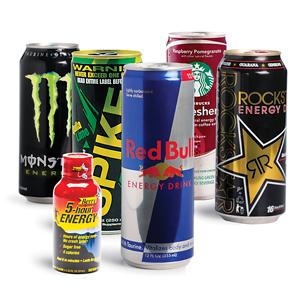 Remember when Mountain Dew was considered the bad boy of the soft drink world? That harmless, albeit toxic-looking soda was first introduced in the forties as a mixer for cocktails and marketed with the slogan, “It’ll tickle yore innards!” Mountain Dew had a whopping 54 mg of caffeine, compared to just 34 for Coke. The average cup of coffee, which for the most part is still considered a grownup beverage, has 135 mg of caffeine. Care to guess how much caffeine is in the typical energy drink?
Remember when Mountain Dew was considered the bad boy of the soft drink world? That harmless, albeit toxic-looking soda was first introduced in the forties as a mixer for cocktails and marketed with the slogan, “It’ll tickle yore innards!” Mountain Dew had a whopping 54 mg of caffeine, compared to just 34 for Coke. The average cup of coffee, which for the most part is still considered a grownup beverage, has 135 mg of caffeine. Care to guess how much caffeine is in the typical energy drink?
We all need a boost now and then. Kids, with their intense academic, extra-curricular, and sports schedules, are especially in need of extra stamina. Where can they turn for it? The $10 billion energy drink industry has a few ideas. Their brands are advertised everywhere. Kids (and their parents), running on empty, are especially attracted to the ads promising extra vitality and enhanced performance. But what’s in these drinks? Are they safe?
These drinks basically consist of water, sugars (either natural or artificial), caffeine, B vitamins, (primarily Vitamin B-12), herbal stimulants like guarana, (a tropical herb that is naturally high in caffeine), and other chemicals like taurine (an amino acid naturally occurring in the body) or glucuronolactone (a naturally-occurring substance in the body involved with glucose metabolism). Guarana is one of the richest sources of caffeine, containing up to three times the amount of caffeine as coffee. Unlike coffee, the amount of caffeine doesn’t have to be listed on guarana-rich drinks, so any drink with that as an ingredient has a caffeine content that is virtually unknown to the consumer. (While guarana is associated with increased attention span, concentration, and memory, it should not be taken if you have bipolar disorder or if you take lithium.) According to the Drug Abuse Warning Network, guarana beverages “provide high doses of caffeine that act as a stimulant upon the central nervous system And cardiovascular system. The total amount of caffeine in a can or bottle of an energy drink varies from about 80 to more than 500 milligrams (mg) of caffeine.”
If the caffeine content itself isn’t alarming enough, consider the way these drinks are consumed. If you have an energy drink with 300 mg of caffeine it compares to drinking almost three cups of coffee or four Cokes, except you are drinking them all at once instead of spread out over a morning or an entire day. That can come as a shock to your system, your heart in particular. While there are no FDA standards for caffeine consumption in the United States, Bill Shaw, MD, with the VCU pediatric and sports medicine program, cites Canada’s recommendations. “Canadian guidelines have been established for caffeine and are often used here,” says Dr. Shaw. “Adults should consume no more than 400 mg a day, pregnant women no more than 300 mg a day, children ages six to twelve, no more than 45 to 85 mg per day.” He believes that children under the age of six should have no caffeine, but the Canadian guideline is 2.5 mg per kilogram of weight. There is a lethal dose of caffeine, Estimated to be 6 to 10 grams (or 6,000 to 10,000 mg), depending in large part on the individual’s weight.

Caffeine toxicity has not been much of a concern in the past because it would require ingestion of huge quantities of soda or coffee to produce these effects. Beverages marketed under the energy drink umbrella packed with high doses of caffeine have changed all that.
What happens when you ingest these drinks? Katie Wood is a 17-year-old high school student from Henrico County. Although she has tried 5-Hour Energy, she wouldn’t recommend it on a regular basis. The junior at Maggie Walker Governor’s High School also believes the drink has its useful applications.
“It might be what you need to stay awake for the school day, but I would never recommend 5-Hour energy during an athletic event or life-changing test such as the SAT, especially for the first time,” Wood says. “Of the three times I have used it, I have experienced concerning reactions twice. In particular, my face felt like it was on fire and I could not keep still – and this was after I’d sipped only a sixth of the tiny bottle.”
Then there’s the 19-year-old California teen who died from a cardiac arrhythmia, which his family claims was a direct result of his drinking top-selling energy drink Monster every day. A 14-year-old Maryland girl died after drinking two cans of the same Beverage. This year, the U.S. Government’s Drug Abuse Warning Network reported thousands of hospital visits over a period of several years related to consumption of energy drinks. More than half of the hospital visits involved young adults ages 18 to 25. In response, Maryland legislature is now considering a law that would ban the sale of these beverages to minors.
Most fatalities linked to energy drinks have involved cardiac arrest or arrhythmias. An arrhythmia is an electrical problem with the rate or rhythm of the heartbeat in which the heart can beat too slow or too fast. During that time, the heart may not pump enough blood to the brain and other organs, which could result in the loss of consciousness or death. In addition to racing heart, irregular heartbeats, and chest pain, other symptoms reported by drinkers and the physicians who treat them include: headache, lightheadedness, anxiety, agitation, tremulousness, extremity and mouth-area tingling, confusion, seizures, tremors, nausea and vomiting, abdominal pain, diarrhea, bowel incontinence, and anorexia.
Should kids have caffeine at all?
Dr. Shaw cited recent studies in the Journal of Food and Chemical Toxicity that note the negative effects of caffeine on children. He reinforced that the biggest danger of caffeine is arrhythmia of the heart or seizures. Regarding adults and caffeine consumption, he emphasizes that alcohol consumed with caffeine is especially dangerous. “Alcohol prevents you from feeling the effects of caffeine and leads to overdose.” He also believes there is an element of toxicity in mixing the two substances together.
Dr. Shaw says young athletes in particular should avoid caffeine – whether it’s delivered in a Monster or a Diet Coke. “Caffeine leads to dehydration and affects the electrolyte balance negatively.” So, when it’s hot outside, it’s especially important to stay away from caffeinated drinks, certainly while playing sports or exercising. The American Academy of Pediatrics agrees with him, recommending no caffeine consumption for children and teens because of potentially harmful effects from the stimulant, including increases in heart rate and blood pressure, and worsening anxiety in those with anxiety disorders.
What do parents think?
Some mothers feel caffeine isn’t a problem, alluding to the amounts consumed by so many of us so frequently, while others share Dr. Shaw’s concern. Meeshell Von Ofenheim, a Richmond teacher, has two children, ages 11 and 12. She says her kids do not drink any caffeinated drinks or high-energy drinks. “At home they mostly drink water, orange or apple juice, milk, and chocolate milk,” says Von Offenheim. For this mother, the importance of modeling healthy choices for her kids is paramount. “It would be different if my husband and I were drinking caffeinated drinks all the time. I do not want to be a hypocrite and drink those power sodas and tell my kids that they are bad for them and they cannot drink them.” Amy Farina is the mother of two young men, one in college and the other in high school. She believes kids under eighteen should not be allowed to drink intensely caffeinated beverages known as energy drinks.
“My kids have tried them but we do not have them around the house. Caffeine is a serious stimulant and teens who are prone to push the envelope anyway cannot be trusted to make good decisions regarding how many of these to consume,” says Farina. “I can tell you that one extra cup of coffee during the day makes my heart pound and keeps me from sleeping, but I’m an adult. How does a kid know whether they are caffeine sensitive like me or not?”
Ultimately, Dr. Shaw says kids of all ages need an overall lifestyle that is healthy with whole-food nutrition, at least one hour of exercise a day, and good sleeping habits. “We all have these hectic lifestyles; I am in it too. It’s easy to cut corners for all our activities, but it’s just not the right thing to do.” Ultimately, Dr. Shaw says if you or your teens are going to drink these beverages, it’s best to check the ingredients, add more fluids to your diet to counter the dehydrating effect of caffeine, and never mix alcohol with caffeine.
What’s in Your Energy Drink?
Monster, sold in 8- to 12-oz cans, is popular with teens and has anywhere from 135 to 240 mg of caffeine, amino acids, and stimulants like guarana, but also a whopping 180 mg of sodium (a lot if you have blood pressure problems), but almost no sugar.
Spike Energy has a whopping 350 mg of caffeine in each can.
Starbucks has jumped on the bandwagon with its version of an energy drink called Refresher, a very mild 60 mg of caffeine, ginseng, and a few vitamins, but 13 grams of sugar in a 12-oz can.
5-Hour Energy, as advertised on TV, is the most popular energy drink and may be the first of its kind. A 2-oz shot contains 138 mg of caffeine, 500 mg of B-12, and lesser amounts of other vitamins. It also has taurine and other amino acids.
Red Bull is the best-selling energy drink among young adults. It has 39 grams of sugar, 80 to 114 mg of caffeine, 60 mg of sodium, with 120 percent of the recommended dose of vitamin B-12, and several other vitamins.
Rockstar has 120 mg of caffeine, few vitamins, and virtually no sugar.



